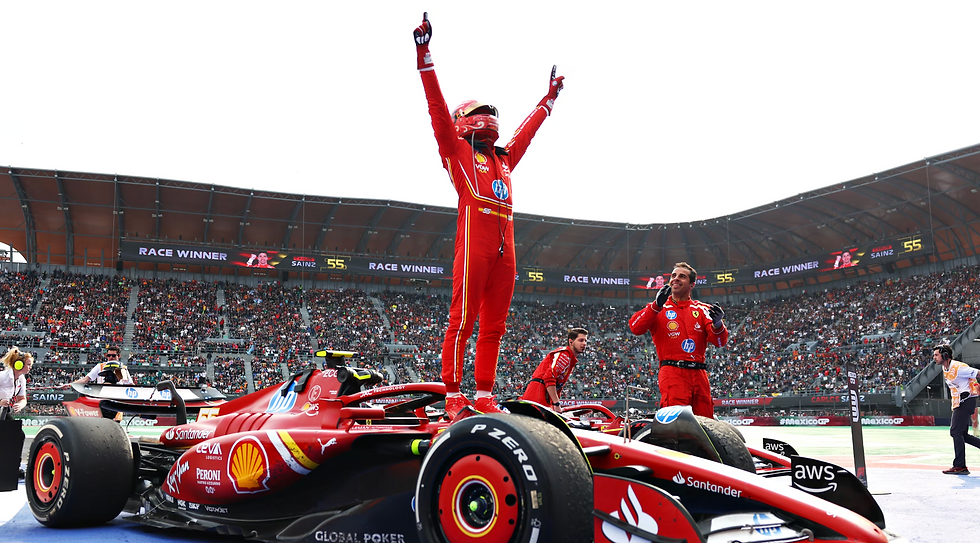The F1 Sprint keeps evolving, but is it worth it?
- Katie Jeromson

- Dec 28, 2024
- 3 min read
Updated: Jan 2
Written by Katie Jeromson, Edited by Vyas Ponnuri

The addition of Sprint Races to the Formula One calendar has certainly been a divisive subject, across the grid, teams and fans. With a third consecutive season of changes complete, have the changes worked?
In 2022, an F1 Sprint weekend consisted of a Friday Practice, Saturday Qualifying, Saturday Practice, Sunday Sprint and Sunday Grand Prix.
A decision that meant an incident in the Sprint could mean no Grand Prix for that driver and team, but also that Parc Ferme rules are in play for Second Practice, so what was the point?
Why would a driver and team bother to risk anything for eight points, when the sought after 25 points for winning the showpiece Grand Prix are on the line?
The concerns were heard, so for 2023, the format for the weekend received changes. Friday now gave us Practice One and Qualifying for the Grand Prix.
Saturday provided the Sprint Shootout (a shortened version of qualifying) and the Sprint itself, with the Grand Prix of course on Sunday.
But one key thing didn’t change. Parc Ferme.
With no large changes to the car possible under Parc Ferme conditions, teams who struggled in the Sprint were left without many options.
It also brought an element of predictability, with Carlos Sainz admitting: “Saturday is too revealing of what's going to happen on Sunday, which is basically the first stint of the race of Sunday.”

On average, drivers who podiumed in the 2023 F1 Sprints had a 77.5% chance of being on the corresponding Grand Prix podium, looking at the race results. In fact, all bar one Sprints of the 2023 season gave us the same Grand Prix winner.
Perhaps this is unsurprising in the era of Max Verstappen and Red Bull dominance, but if the Sprints are about more action for the fans, how much was this providing?
Enter 2024.
Practice One remained on Friday but it was followed by the Sprint Shootout. Saturday starts with the Sprint, after which the cars come out of Parc Ferme, before Grand Prix Qualifying later that day. As always the Grand Prix upheld tradition, being a singular event on Sunday.
So changes were made, but did they make a difference? During the 2024 season, the same podium finishers in the Sprint were also the Grand Prix podium finishers just 44% of the time, a 33.5% decline.
Only once did the Sprint winner take the spoils for the corresponding Grand Prix on Sunday, in the form of Verstappen in China at the beginning of the season. So, just looking at the numbers, it seems they may have cracked it.
Verstappen has always been one of the biggest critics on Sprints, however with the 2024 changes admitted he “enjoyed it a bit more.” With 2024 team mate Sergio Perez also adding: “it kind of gives the teams a little bit more time to extract the maximum.”

There are undoubtedly other considerations that have contributed to the more competitive Sprint showings in 2024, most importantly the finer margins between the teams themselves.
From an utterly dominant Red Bull season in 2023, where the team won all but one round, the 2024 season saw seven different winners, with McLaren and Ferrari going head to head into the season finale, just 21 points between them.
This was also reflected by the standings, with a spread of 77 points across the top three constructors McLaren, Ferrari and Red Bull, compared to the huge 454-point spread in 2023 between Red Bull, Mercedes and Ferrari
The closer nature of the field has of course led to more battles, with Max Verstappen and Lando Norris coming to blows, most notably at the Austrian Grand Prix where damage to both cars gifted a win to George Russell.
Verstappen and Norris were first and third respectively in the Sprint, but due to their contact found themselves fifth and 20th, with Norris not seeing the chequered flag. So it could be argued that this skews the data, but what is a season without a few upsets?

Categorising the 2024 format changes as a success or failure will ultimately come down to what you want out of F1. Do you want to see ultimate domination from a driver or team? Well, that will come down to just how good they are, keeping the consistency across both race formats.
If you want to see the biggest chance of a redemption arc? Or maybe you just want to see the best battles possible on the track? In that case, perhaps 2024 suits you best, as disaster in the Sprint no longer spells the end of a weekend.














Comments